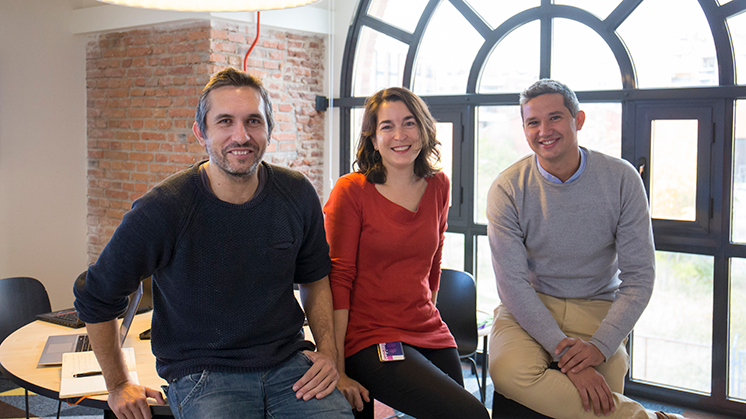Carbon footprint measurement
We use GreeMko's software to measure the carbon footprint of the Mad Cool festival thanks to the PERSEO start-up programme
February 2023. Reading time: 2 minutes
Iberdrola's start-up programme, PERSEO, has facilitated a leap in the projection of Spanish company Green Management Technology (GreeMko), thanks to the opportunity to develop a pilot of its technological solution for carbon footprint measurement at the Mad Cool music festival in Madrid in 2022. We interviewed the CEO and co-founder of the start-up company, Jorge Portillo de Armenteras, about the experience collaborating with Iberdrola, the results of the project and the importance of carbon footprint awareness.
Green Management Technology (GreeMko) was the Spanish technology company selected by Iberdrola to collaborate in the challenge of making the 2022 Mad Cool music festival in Madrid more sustainable, measure its carbon footprint and thus improve the environmental impact of this international macro event in future editions as part of the path towards decarbonisation.
GreeMko came to this project through Iberdrola's start-up programme, PERSEO, which backed its innovative software as part of its pilot testing initiative. In order to approach this work, the emerging technology company first determined the environmental aspects of the event that generated greenhouse gas emissions (carbon footprint scope 1 and 2, according to the standards of Science Based Targets ) as well as customising a mobility solution to understand the impact of festival-goers' journeys and raise awareness (carbon footprint scope 3).
"There is a society that is increasingly concerned about the environment and that, as a consumer, employee or citizen, wants to buy or work in responsible companies."
Jorge Portillo de Armenteras, CEO of GreeMko
GreeMko's CEO, Jorge Portillo de Armenteras, tells us in an interview more details about the company, its innovation project, its shared values with Iberdrola regarding the carbon neutrality goal and the experience collaborating with us at the Mad Cool festival.
With what mission was GreeMko founded and what kind of work do you do nowadays?
GreeMko -from Green Management Technology- was born with the mission to help companies on their way to environmental sustainability and carbon neutrality thanks to technology and innovation. Software for companies of any size and sector to actively manage their environmental impact, including the carbon footprint of the three scopes.
Our simplest plan allows companies to calculate, prepare a reduction plan and report their CO₂ emissions and carbon footprint for scopes 1 and 2 (direct and indirect electricity). Our PRO Plan goes one step further to make it easier for companies to manage their entire environmental management and also calculate their full carbon footprint with scopes 1, 2 and 3 (direct and indirect emissions).
We are the only solution where it is not necessary to enter the data by hand thanks to our algorithm that automatically captures all the data from the evidence, which allows for an automatic, efficient and traceable process, thus reducing the errors and resources necessary for this type of task.
We also have a solution for calculating the carbon footprint of travel that is mainly focused on raising awareness, as it allows us to instantly know the carbon footprint of a trip. This solution can be used to calculate the impact of employee travel as well as that of event attendees and is the one we had the opportunity to collaborate with Iberdrola.
How was the experience working for the Mad Cool festival? What digital solutions did you bring to the event and to the users?
Working on the calculation of the carbon footprint of one of the most important music events in Southern Europe was undoubtedly a milestone for us, but also a challenge.
On the one hand, we determined the environmental aspects of the event that generated greenhouse gas emissions (carbon footprint scope 1 and 2), in addition to customising the mobility solution (carbon footprint scope 3) to understand the impact of festival-goers' journeys.
During the event, attendees were encouraged to participate in the mobility solution by accessing it via a QR code. This digital solution allowed each attendee to instantly know the individual carbon footprint of each journey to the festival.
What is your assessment of the collaboration with Iberdrola in the framework of the PERSEO pilot project programme?
From my point of view, in order to collaborate with companies of Iberdrola's size, several factors have to be in place: Obviously, you have to satisfy a need (or propose an innovative solution and create the need); but also important are the timing, the right people and the way of working.
The PERSEO programme for start-ups is undoubtedly a platform that allows us to speed up this process, as otherwise the resources that a company like ours would need to identify the need, the time and the specific person within Iberdrola would make the project unfeasible. PERSEO allows us to have a single point of contact that facilitates collaboration and helps us to be more efficient in terms of dedication of resources.
"PERSEO allows us to have to have a single point of contact that facilitates collaboration and helps us to be more efficient in terms of resource commitment."
Is it essential to measure and know our carbon footprint on the road to neutrality?
Undoubtedly, the first step to improve is to measure, so it is essential to make a good diagnosis. But before this diagnosis, there must be a clear commitment, in terms of time and resources, on the part of company management for this to happen. On the other hand, employee training on carbon neutrality is not only necessary but essential to achieve the objectives set.
What actions can we take on the basis of these data?
With the diagnosis carried out, a strategic plan should be drawn up, establishing short- and long-term objectives. Draw up a reduction and mitigation plan identifying which actions can be undertaken without major investments and to which resources should be allocated.
Frequent monitoring of performance is critical to achieving targets, which is why we believe that a solution such as ours is essential for companies to achieve their environmental sustainability goals.
Have you noticed an increased interest in carbon footprint calculation and analysis services in recent years?
Without a doubt, and especially after the presentation of the European Green Deal that aims to make Europe the first climate-neutral continent by 2050. But also recent publications, such as the World Economic Forum's Annual Global Risks Report, show that half of the top ten risks in the next two years are associated with climate change, and this situation worsens if extended to ten years.
The economic mobilisation that needs to take place to carry out the transition and mitigate these risks is enormous, which is why the financial world is increasingly focusing on this "opportunity". At the same time, society is becoming increasingly aware of sustainability issues, concerned about the environment and, as a consumer, employee or citizen, wants to buy or work for responsible companies.
Regulation, financing and awareness are for me the three levers necessary for the transition to a more sustainable economy to happen, and there is clear evidence to see that all three are happening in tandem. The only question is whether the speed of change is appropriate.
"The clients who most demand our services do not have a specific profile, but rather those who see active environmental management as an element of competitiveness and differentiation."
What is the customer profile that most demands it?
The clients who most demand our services do not have a specific profile, but rather those who see active environmental management as an element of competitiveness and differentiation, and who have understood that environmental sustainability is not a fad, that it is here to stay and that its regulation is going to be increasingly strict.
Do you think that there is sufficient dissemination and awareness in society about the carbon footprint generated by our activity?
There is still a long way to go. It is true that more and more people are talking about these issues in the professional and personal sphere, but there is still a long way to go. Sustainability is not a destination but a path, so we must work on continuous improvement.
We must include sustainability in our daily decisions, both personal and professional. We are all part of the change needed for an increasingly sustainable economy.






